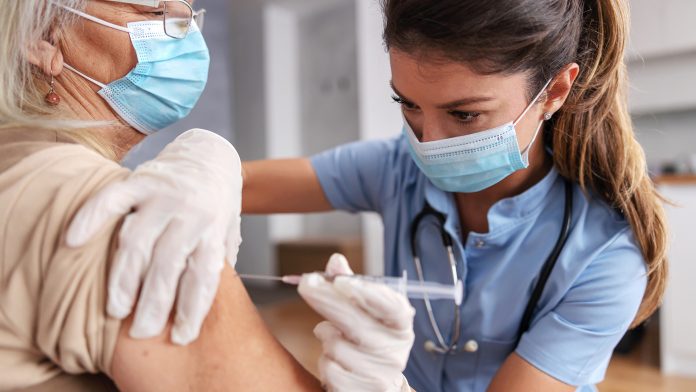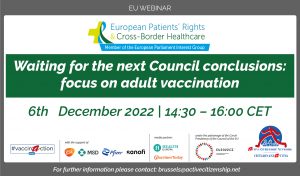
Ahead of a meeting between EU health ministers on vaccination policy in November this year, Mariano Votta and Daniela Quaggia from the Active Citizenship Network address the importance of strengthening adult immunisations across Europe.
The pandemic has made it clearer than ever that immunisation must be considered a key pillar of any modern and resilient EU healthcare system. Vaccinations are effective and important at any age: they protect individuals, families, communities, and health systems. Diseases such as meningitis, diphtheria, herpes zoster, pneumococcal disease, influenza, pertussis, and other vaccine-preventable diseases can have serious and potentially long-term consequences at various stages of life.
In the EU, routine lifelong immunisation could protect the population against 20 life-threatening infectious diseases, yet there is a significant discrepancy in the vaccinations offered to European citizens, ranging from eight to 17 publicly funded vaccines depending on the country.**1
The impact of COVID-19 on vaccination rates
The COVID-19 pandemic and lockdowns have led to a decline in routine immunisations in all age groups; data on vaccination coverage in adults and at-risk groups are often not collected systematically or in a timely manner, unlike for paediatric and adolescent vaccinations, as well as COVID and, to some extent, influenza vaccinations.
Vaccinations are not just for children and teenagers, but also adults. With the ageing of the population in the European Union, where the proportion of the population aged 50 and over is expected to reach 50% by 2025, it is increasingly necessary to prioritise adult vaccination at the same level as paediatric vaccination. Older adults are at greater risk of vaccine-preventable diseases due to age-related immune system decline and existing chronic conditions. Harmonisation and planned monitoring of vaccination coverage in adults should be widespread and considered a necessity in Europe, potentially building from the **COVID-19 vaccine tracker (ECDC)**.
EU health ministers will meet later this year, under the Czech Presidency of the European Council, to discuss European Institutions’ commitment to vaccination. The expert meeting on vaccination, to be held in Prague on 21 and 22 November, is an excellent opportunity to ensure that vaccines are seen as a lifelong saving rather than a cost. There is a clear need to consider life-course vaccination in these policy discussions.
Prioritising adult immunisation in Europe
We are appealing to the Presidency of the Council of the European Union to support the need to prioritise adult immunisation to help ensure the protection of the most vulnerable and reduce the burden on healthcare systems.
To achieve this, we should:
- Commit to maintaining and evolving national immunisation plans, improving uptake of existing vaccines and the inclusion of innovations for adults;
- Review, protect and expand budgets for current and new immunisation programmes, especially for adults and for diseases where current recommended targets are not regularly met;
- Build processes in the ongoing mass vaccination against COVID-19 to monitor the status of general adult vaccination, particularly against all vaccine-preventable respiratory diseases (VPRDs) recommended for adults, such as influenza, which could be co-administered;
- Expand the scope of pharmacists, in line with the demands of the International Pharmaceutical Federation (FIP), by urgently updating legal and regulatory requirements to allow pharmacists to vaccinate eligible patients against all vaccine-preventable diseases for adults, to protect vulnerable populations and strengthen the capacity of the healthcare system in both routine and emergency contexts;
- In addition, all healthcare professionals besides General Practitioners (nurses, pneumologists, diabetologists, oncologists and others) should encourage patients to consider vaccination to prevent VPDs and their consequences;
- Make information on vaccines more accessible by improving healthcare professionals’ and governments’ communication on immunisation and ensuring that clear and targeted information is provided in response to different local and age contexts; and
- Harmonise vaccination programmes, both schedules and data recording systems, to improve EU coordination and decision-making, cross-border care and facilitating life (at work, travelling, etc.).
To achieve a lifelong immunisation culture, it is vital to recognise the role of patient and citizen associations in building confidence in vaccination and sharing accurate information. Communication campaigns can help improve adult vaccination, while increased health literacy also has a role to play.
As part of its efforts to strengthen adult vaccination in Europe, Active Citizenship Network (ACN) has organised the ‘Waiting for the next Council Conclusions: focus on adult immunisation’ webinar hosted by the MEPs Interest Group ‘European Patients’ Rights & CrossBorder Healthcare’. The event takes place on 6 December, from 14:30 to 16:00 CET, you can find all the details **here** including the **registration link**.
Our shared hope is that we do not waste this opportunity to take urgent action to prioritise and strengthen adult immunisation programmes, improve the adult immunisation ecosystem (e.g. additional vaccination points, and adult vaccination registries) and improve vaccination equity by ensuring that all adults are aware and have access to vaccines against preventable diseases. If we take the right actions now, we can better protect all populations and improve the resilience of healthcare systems for the future.
References
- Ethgen O, **Rémy V and Wargo K (2018). Vaccination budget in Europe: an update, Hum Vaccin Immunother. Vol. 14(12): 2911–2915. **https://pubmed.ncbi.nlm.nih.gov/30060702/**











